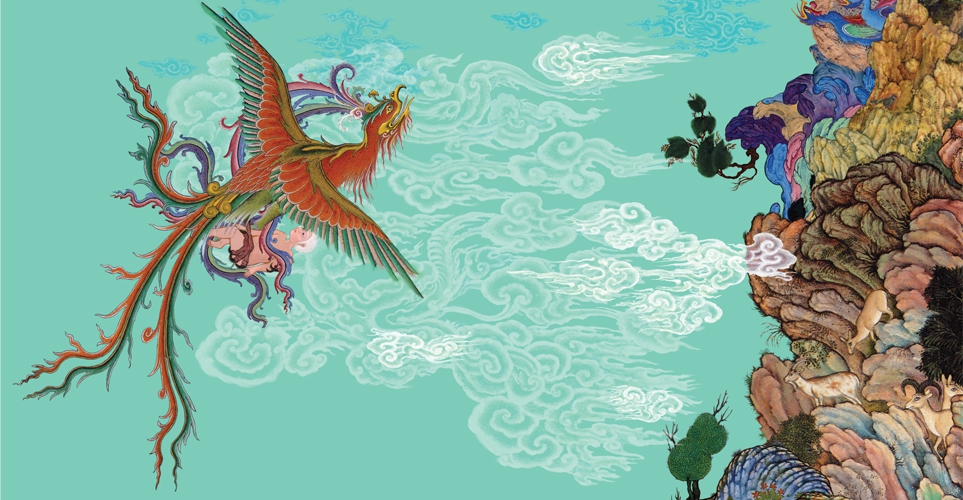The poem tells a tale which has curious parallels with the origin story of Fulgrim.
Saum was a mighty lord in the south of Iran. It came to pass that a son was born unto him, beautiful of face and limb, who had neither fault nor blemish save that his hair was as white as snow. When Saum saw the infant, his heart was filled with fear that child's hair was an ill omen. He commanded his servants to take the child and cast it forth out of the land.
At the foot of the great mountain Damavand, the highest volcano in Asia, was laid the child of Saum. There the mighty phoenix like Simurgh, the bird of marvel, had built her nest. When the Simurgh spied the infant lying on the ground, she did raise the child to her shelter and did raise him as a brother to her own young ones. And thus did the child grow to be a youth full of strength and beauty, and his renown filled the land.
Then it came to pass that Saum dreamed of his son, and he feared for his sin. And Saum did travel to the mountain of Damavand and bowed to the dust in penitence. The Simurgh gave three magic feathers to Saum's son, telling him that he would be able to summon her at any time by burning them. The Simurgh did then return the boy to Saum, and the youth was clothed in rich robes and named Zal, which means the white haired one.
Zal increased daily in wisdom and strength and his fame filled the land. When Saum went forth to fight the battles of the Shah, he left his kingdom under his son's hands and Zal administered the land with judgment and virtue.
Then it came that Zal was visited by a neighboring lord named Mihrab of Kabul in Afghanistan, who was of the serpent people. Mihrab had a daughter named Rudabeh who was "unto the slender cypress, her face brighter than the sun and her mouth like a pomegranate flower." Zal and Rudabeh burned with love for each other, so they could neither eat nor rest. And thus they pledged to be married.
However when the Shah, who was Saum's overlord, heard of the betrothal he was incensed that the heir of one of his lord's should be married to one of the serpent people. He commanded Saum to destroy Mihrab's people with his army.
Mihrab knew that his followers could not battle Saum's great army and with great grief planned to exile his daughter through a portal to the land of the dead in seven days. However, Zal traveled to the court of the Shah and sought audience with him to beg him to change his mind.
And the Shah did test Zal to see if he was worthy. His wise men did test Zal's wisdom by asking him riddles. And his soldiers did test his mightiness by engaging his in deeds of archery and spear fighting and wrestling. In all these matters did Zal emerge victorious.
Thus did the Shah approve of Zal's marriage to Rudabeh. The son of Zal and Rudabeh was named Rostam, and was one of the greatest heroes of Persia.
Like Zal, Fulgrim had white hair and was banished from the presence of his father to be raised in an alien world. His symbol was a magical bird, and he defied the Emperor by falling under the spell of a scion of the serpent people.




No comments:
Post a Comment